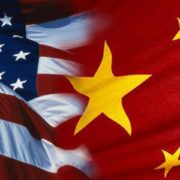What’s really happening between the American and the Chinese navies – after two ships almost ran into each other in the South China Sea on September 30 – could determine the future ties of the countries.
Are the two navies talking to each other to avoid future incidents? Are the respective governments involved? If so, to what extent and to what result? These are some of the questions regarding what occurred on September 30.
Then, apparently a US Navy ship, the destroyer Decatur, was on a cruise through the South China Sea, which is claimed by Beijing. Trying to shoo away the US vessel, a Chinese Navy ship almost rammed the Americans. The Chinese moved within some 40 to 50 yards of the US ship, which with those huge hulls in the sea would be like cars on the road missing a crash by centimeters.
Nothing happened but the US Navy decided to release the news and pictures as a warning to the Chinese: do not come close to us again or an accident could really happen.
Here, there is a precedent. On April 1, 2001, a US surveillance plane, harassed by a Chinese fighter, flipped its wings to disturb the fighter. The Chinese plane, flying too close, lost control, crashed into the US plane’s tail, and sank into the sea. The damaged US plane crash landed on China’s Hainan island. The ensuing diplomatic row sent bilateral tensions sky high, and it looked as if the two might come to blows.
The situation changed suddenly when al-Qaeda attacked the Twin Towers in New York on September 11, and America moved its attention away from China and toward the war on terror.
In the South China Sea, the two ships didn’t crash, but there is little likelihood of a massive event like 9/11 to distract the US from China in this moment. It is also unlikely that the US will stop sending ships into the disputed sea because that would be tantamount to recognizing the Chinese claim there. This is something not only the US but also many China’s neighboring countries contest.
What will the Chinese Navy do? Also, is the Beijing government fully aware of how close the Chinese Navy came while running its harassing missions? And is it fully aware of the possible dangers?
The Chinese position is equally delicate. If it gives up its missions, would it be equivalent to giving in to US pressure? Would it be seen as an act of weakness internally? Actually, in the past, some in Beijing argued that China doesn’t need to do anything: holding on to its claim on the area would be sufficient, without spending resources on patrols.
Are the Navy missions then sanctioned by the Politburo, and if so, to what extent? Here, internal and external politics intersect dangerously.
The intentions of the PLA Navy are clear: to show off its skills and get more money out of it. What are the political intentions of the Chinese government? Are they to be dragged into increased military tensions when commercials rows are piling up?
The smart move in Beijing would be to stop the Navy patrols and show its peaceful intentions, something that would also help in the ongoing trade war. But the balance of power and calculations are unclear – and as such, everything is up in the air.





